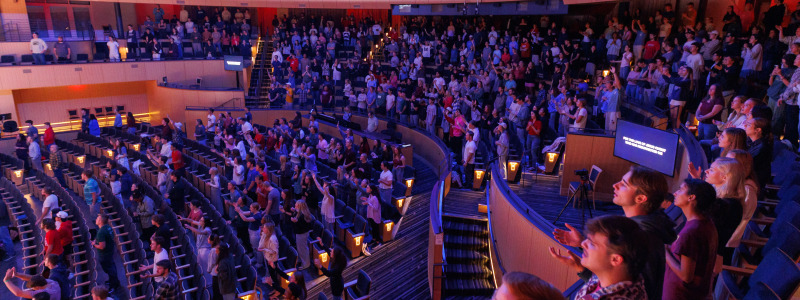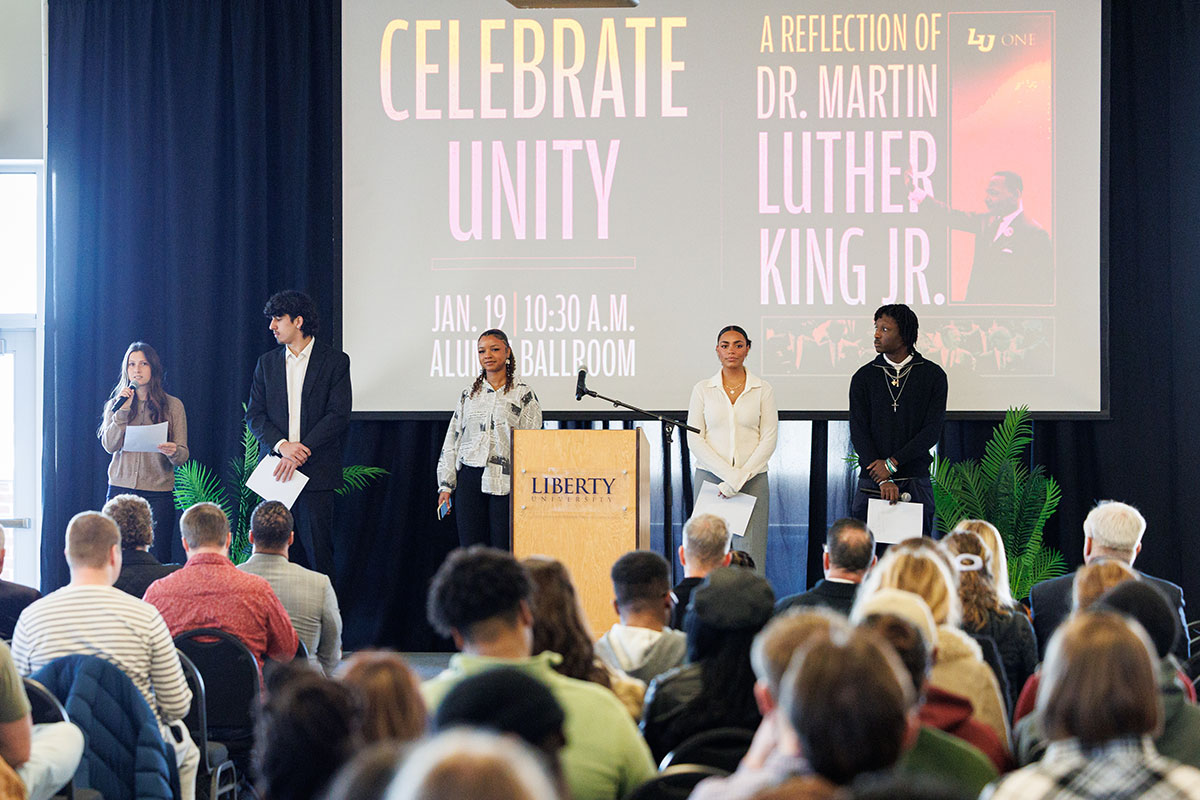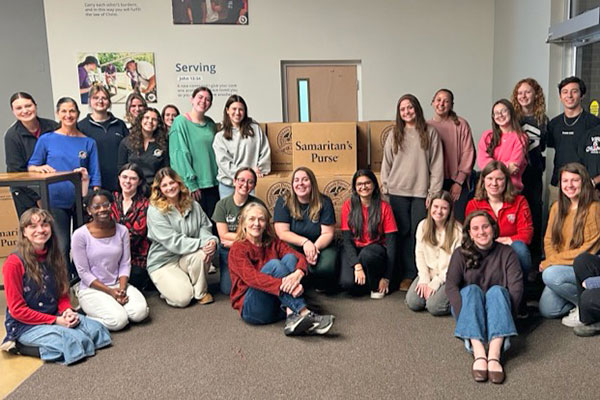Gospel Coalition editor says he sees ‘vibe shift’ in Gen Z during Liberty’s annual Next Gen Conference
September 18, 2025 : By Christian Shields - Office of Communications & Public Engagement
Liberty University’s Center for Apologetics & Cultural Engagement and Center for Youth Ministries hosted their annual Next Gen Conference on Tuesday evening, providing students the opportunity to hear from a Christian scholar on how to engage current culture with the Gospel.
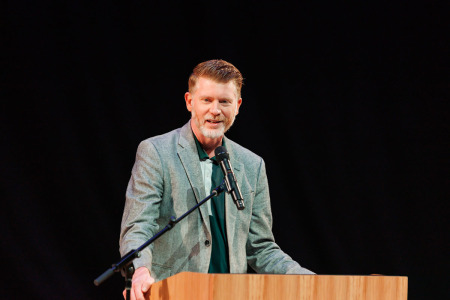
Following a time of worship led by the John W. Rawling’s School of Divinity YouthQuest Worship Team, the event, held in the Center for Music and Worship Arts, Concert Hall, featured a presentation from The Gospel Coalition Senior Editor Brett McCracken on metamodernism.
McCracken, who has authored five books on Christian culture, defined metamodernism as the synthesis of both modern thought (held from the late 18th century through the 1960s) and postmodern thought (1960s until the turn of the century).
While modern thought placed a strong belief in science and a prioritization of reason over religion, McCracken said postmodern thinking was often skeptical of objective truth and emphasized deconstruction of commonly held beliefs. Stemming from both philosophical approaches, metamodernism seeks objective truth with a desire to advance society, while simultaneously being skeptical of anyone proclaiming to know truth. Despite its desire for progress, he said metamodern thought recognizes that not all progress is beneficial to society.
 “The concrete way we see the metamodern mode in our society today is simply that digital life has shaped us to be unmoored. We are ideological free agents who are unbound by the rules of modernism, postmodernism, or any other ‘ism.’ We are free to take or leave any aspects of any of these things as it suits us.”
“The concrete way we see the metamodern mode in our society today is simply that digital life has shaped us to be unmoored. We are ideological free agents who are unbound by the rules of modernism, postmodernism, or any other ‘ism.’ We are free to take or leave any aspects of any of these things as it suits us.”
Acknowledging the apparent contradictory nature of metamodernism, McCracken said the rise of the internet and social media has exposed netizens to various viewpoints, in turn sparking a desire to search for truth. He said this has also led to a “bespoke spirituality,” or à la carte approach to religion in which people choose which aspects of religion they like while rejecting anything they don’t. In addition, he said people also now gravitate more toward emotion and “vibes,” or feelings, instead of the full substance of reality.
As Christians seek to navigate the culture shift to evangelize, McCracken posited the importance of sound, theological teaching combining a proper, logical understanding of God with an emphasis on the relational nature of the Creator. He said the current generation desperately desires a solid moral framework and method for problem-solving, both of which are offered through Christianity.
“There is reason to be very encouraged, because there is a real hunger right now,” he said. “It is palpable. The vibe shift is real. Gen Z’s return to church is well-documented, and newfound interest in Christianity among young people today is a real thing. I think this may be one of the greatest evangelical opportunities of the last century.”
 “Every revival movement comes with its own discipleship challenges, but God can shape and use metamodern souls just as much as He did postmodern souls, modern souls, and premodern souls,” he added. “In every generation, God is at work. His Gospel grabs people no matter what the prevailing cultural movement might be.”
“Every revival movement comes with its own discipleship challenges, but God can shape and use metamodern souls just as much as He did postmodern souls, modern souls, and premodern souls,” he added. “In every generation, God is at work. His Gospel grabs people no matter what the prevailing cultural movement might be.”
After his presentation, McCracken opened the floor to questions. On Wednesday afternoon, he led two breakout sessions during class periods to further explore metamodernism and foster discussion.
Executive Director of the Center for Youth Ministries Dr. Derik Idol said it is important to introduce students to experts like McCracken who can further expand on concepts learned in the classroom, and the Next Gen Conference fosters this type of learning.
“One of the values for us is we want to train our ministry leaders and those entering ministry to understand culture, how to engage culture, and how to think right about different circumstances and situations, because culture is going to change,” he said.
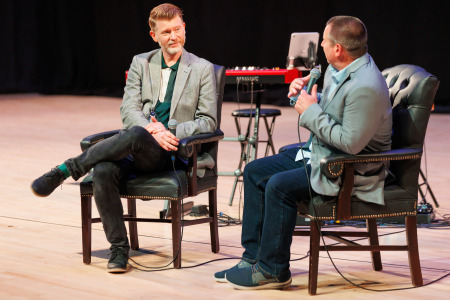
“We don’t want to just teach them about culture now and how to engage it with the Gospel to advance the Kingdom, but we also want to teach them how to think, so as culture changes over time, they know how to adjust and engage and connect as well,” Idol added. “That doesn’t mean the message changes; the Bible never changes. But how we connect and deliver certain things in ministry and church may be impacted by that.”
Dr. Kevin Richard, executive director of the Center for Apologetics and Cultural Engagement, said the Next Gen Conference enables students to keep abreast of the rapid changes in contemporary culture and constantly analyze how those cultural shifts affect daily life.
“As we emphasize cultural engagement in this program, we encourage students to be cultural interpreters,” he said. “We really take on this disposition of trying to interpret what is going on (in society). So you can listen to a song and enjoy it for what it is but in the same vein pick up the underlying tone and the motivations that are influencing it.”
